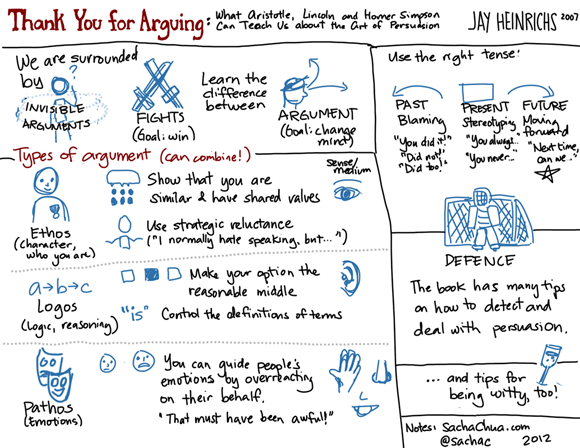Visual book review: Thank You for Arguing: What Aristotle, Lincoln, and Homer Simpson Can Teach Us about the Art of Persuasion
Posted: - Modified: | book, communication, visual, visual-book-notesJay Heinrichs’ Thank You for Arguing: What Aristotle, Lincoln and Homer Simpson Can Teach Us about the Art of Persuasion is one of my favourite books. You know how we walk around thinking that rhetoric is evil and arguments are to be avoided? He shows how knowing about persuasive techniques – and using them well – can make life better, and how kids who know how to argue correctly are adorable. Well, he doesn’t explicitly make that last point, but it’s entertaining seeing him get bested by his 5-year-old daughter.
Read this book so that you can get better at detecting and dealing with invisible arguments that surround you. Learn how to combine the elements of ethos, logos, and pathos to argue persuasively. Don’t get stuck in blame games or stereotyping fights; stay focused on the future and help people move forward. Use wordplay to be wittier.
The book is packed with tips, and well worth keeping on your reference shelf. I liked it so much that I bought a paperback copy and a Kindle e-book (which was more expensive than the paperback, pff!)
Thank You for Arguing: What Aristotle, Lincoln and Homer Simpson Can Teach Us about the Art of Persuasion
Jay Heinrichs
2007: Three Rivers Press
ISBN: 978-0307341440
For more detailed notes, see my 2010 review of Thank You for Arguing.
Here’s the text from the image to improve people’s ability to search for it:
Thank You for Arguing: What Aristotle, Lincoln and Homer Simpson Can Teach Us about the Art of Persuasion
Jay Heinrichs 2007
We are surrounded by
INVISIBLE ARGUMENTS
FIGHTS (Goal: Win)
Learn the difference between
ARGUMENT (Goal: change mind)
Types of argument (can combine!)
Ethos (character, who you are)
Show that you are similar & have shared values
Use strategic reluctance (“I normally hate speaking, but…”)
sense/medium
a b c
Logos (logic, reasoning)
“is”
Make your option the reasonable middle
Control the definitions of terms
Pathos (Emotions)
You can guide people’s emotions by overreacting on their behalf.
“That must have been awful!”
Use the right tense:
PAST
Blaming
“You did it!”
“Did not”
“Did too!”
PRESENT
Stereotyping
“You always…”
“You never…”
FUTURE
Moving forward
“Next time, can we…”
DEFENCE
The book has many tips on how to detect and deal with persuasion.
…and tips for being witty, too!
Notes: SachaChua.com
@sachac 2012

